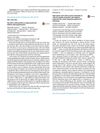 January 2024 in “International Journal of Dermatology”
January 2024 in “International Journal of Dermatology” Targeting Interleukin-13 could help treat alopecia areata linked with atopic dermatitis.
 December 2023 in “European Journal of Medicinal Chemistry”
December 2023 in “European Journal of Medicinal Chemistry” Natural products might be safe, effective, and affordable treatments for hair loss.
 November 2023 in “The Journal of Urology”
November 2023 in “The Journal of Urology” The conclusion is that future trials should report specific details about the PRP composition to better understand its effects on urologic conditions.
 October 2023 in “Microorganisms”
October 2023 in “Microorganisms” Nirmatrelvir/Ritonavir treatment may lead to a weaker immune response to COVID-19, but doesn't affect the chance of rebound.
 August 2023 in “Medical Hypotheses”
August 2023 in “Medical Hypotheses” Metformin, usually used for diabetes, can also help treat hair loss from alopecia areata due to its ability to reduce inflammation and stimulate new hair growth.
 April 2023 in “Journal of Investigative Dermatology”
April 2023 in “Journal of Investigative Dermatology” An oil-in-water emulsion with CBD and ginger root extract significantly improved symptoms of dry and eczema-prone skin.
 January 2023 in “Applied sciences”
January 2023 in “Applied sciences” Gefitinib and Sasam-Kyeongokgo together significantly reduce cancer growth and improve immune response in mice.
 January 2023 in “International Journal of Dermatology and Venereology”
January 2023 in “International Journal of Dermatology and Venereology” Many people experienced hair loss after having COVID-19, with the worst cases in hospitalized patients, and some saw hair regrowth within six months.
 January 2023 in “The Egyptian Journal of Hospital Medicine”
January 2023 in “The Egyptian Journal of Hospital Medicine” New treatments for sudden hair loss include oral medications and a special laser, both showing promise in hair regrowth.
 November 2022 in “The journal of investigative dermatology/Journal of investigative dermatology”
November 2022 in “The journal of investigative dermatology/Journal of investigative dermatology” Skin organoids with NCSTN mutation show changes in hair follicle development and higher inflammation, key features of Hidradenitis Suppurativa.
 November 2022 in “Medicina”
November 2022 in “Medicina” COVID-19 may cause temporary hair loss due to the body's immune response.
 November 2022 in “DOAJ (DOAJ: Directory of Open Access Journals)”
November 2022 in “DOAJ (DOAJ: Directory of Open Access Journals)” COVID-19 may cause hair loss months after infection.
 July 2022 in “Singapore Medical Journal”
July 2022 in “Singapore Medical Journal” Most children with alopecia areata improved with treatment, but those with more hair loss had worse outcomes.
 April 2022 in “International journal of respiratory and pulmonary medicine”
April 2022 in “International journal of respiratory and pulmonary medicine” People with lower levels of free testosterone tend to have worse COVID-19 outcomes.
 January 2022 in “Figshare”
January 2022 in “Figshare” Melatonin affects specific gene patterns and biological processes in goat hair growth.
 January 2020 in “Research Square (Research Square)”
January 2020 in “Research Square (Research Square)” Stress hormone CRF causes hair loss and stops hair cell growth.

Aging disrupts skin repair and stress responses, but exercise-related IL-15 improves wound healing and skin health in older skin.
January 2020 in “Figshare” Finasteride worsens heart damage but reduces cell toxicity caused by nandrolone decanoate.

Activin A increases inner ear hair cell development, while follistatin decreases it.
 April 2018 in “Journal of Investigative Dermatology”
April 2018 in “Journal of Investigative Dermatology” Both Th1 and Th2 immune responses are increased in alopecia areata, with Th2 response more strongly linked to how severe the disease is.
 April 2017 in “Journal of Investigative Dermatology”
April 2017 in “Journal of Investigative Dermatology” SM04755 may be an effective topical treatment for psoriasis.
 April 2017 in “Journal of Dermatological Science”
April 2017 in “Journal of Dermatological Science” B cells can both help and hinder the body's defense against melanoma.
 March 2017 in “Trichology and cosmetology:”
March 2017 in “Trichology and cosmetology:” Psoriasis treatment may affect body hair growth, with a complex relationship between skin and hair growth mechanisms.
January 2016 in “대한미용학회지” Lavender oil promotes hair growth in mice.
January 2015 in “대한미용학회지” Sandalwood oil promotes hair growth in mice.
 March 2014 in “Journal of The American Academy of Dermatology”
March 2014 in “Journal of The American Academy of Dermatology” TNF-a may not be as involved in certain types of hair loss as previously thought.
 January 2011 in “Annals of dermatology/Annals of Dermatology”
January 2011 in “Annals of dermatology/Annals of Dermatology” A woman's psoriasis improved after hepatitis C treatment with interferon, despite interferon's risk of worsening skin conditions.
January 2009 in “한방재활의학과학회지” Saengbal-eum-2 promotes hair growth and reduces inflammation in mice.
 October 2005 in “CRC Press eBooks”
October 2005 in “CRC Press eBooks” Telogen effluvium is a condition where hair falls out due to various factors like illness, stress, or nutrient deficiency.
July 1997 in “JEADV. Journal of the European Academy of Dermatology and Venereology/Journal of the European Academy of Dermatology and Venereology” TGF-β is found in hair follicles and may cause hair loss in alopecia areata.

























